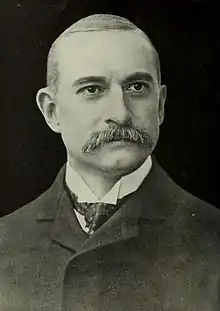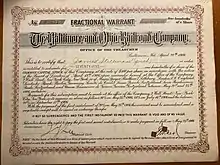James Stillman
James Jewett Stillman (June 9, 1850 – March 15, 1918) was an American businessman who invested in land, banking, and railroads in New York, Texas, and Mexico. He was chairman of the board of directors of the National City Bank.[1] He forged alliances with the Rockefeller family, Standard Oil and Kuhn, Loeb & Co. to lay a foundation that made it, arguably, "the greatest bank in the Western Hemisphere."[2] He engaged in an expansion policy that made National City the largest bank in the United States by 1894, the first to open foreign branches, and a leader in foreign exchange.[3] By 1902, the bank was able to pay any sum of money to any city in the world within 24 hours.[4] He was worth approximately $77 million at the time of his death, making him one of the wealthiest people in the country at the time.
James Stillman | |
|---|---|
 | |
| President of National City Bank | |
| In office 1891–1909 | |
| Preceded by | Percy Rivington Pyne I |
| Succeeded by | Frank Arthur Vanderlip, Sr. |
| Chairman of National City Bank | |
| In office 1909–1918 | |
| Succeeded by | Frank Arthur Vanderlip, Sr. |
| Personal details | |
| Born | James Jewett Stillman June 9, 1850 Brownsville, Texas, U.S. |
| Died | March 15, 1918 (aged 67) New York City, U.S. |
| Spouse | Sarah Elizabeth Rumrill |
| Children | Sarah Elizabeth Stillman James Alexander Stillman Isabel Goodrich Stillman Charles Chauncey Stillman Ernest Goodrich Stillman |
| Parent(s) | Charles Stillman Elizabeth Pamela Goodrich |
| Occupation | Banker |
Biography
Stillman was born on June 9, 1850, to Charles Stillman (1810–1875) and Elizabeth Pamela Goodrich in Brownsville, Texas, a town founded by his father. Both of his parents were born in Wethersfield, Connecticut. Charles Stillman had significant business interests which James acquired in 1872. He expanded those to control of sixteen Texas banks and a significant land holdings in the Rio Grande Valley, particularly Corpus Christi and Kerrville, Texas.[5]

Stillman was an investor in a Fractional Warrant of the Baltimore & Ohio Railroad.
Along with Edward Henry Harriman, Jacob Henry Schiff and William Rockefeller, he controlled the most important Texas railroads (including the Texas and Pacific Railway, the Southern Pacific Railroad, the International-Great Northern Railroad, the Union Pacific Southern Railway, the St. Louis, Brownsville and Mexico Railway, and the Mexican National Railroad).
In 1876, Stillman supported Porfirio Díaz's overthrow of the government of Mexico by the Revolution of Tuxtepec.
He was chairman of the board of directors of the National City Bank and retired in 1908.[1]
He died on March 15, 1918, at his home on 9 East 72nd Street in Manhattan, New York.[1] His funeral was at St. Bartholomew's Episcopal Church, New York.[6]
Personal life & family
James Stillman was married to Sarah Elizabeth Rumrill from 1855 to 1925.[7] Together they had:
- Sarah Elizabeth "Elsie" Stillman (1872–1935), who married William Goodsell Rockefeller (1870–1922), a son of Standard Oil senior executive William Rockefeller
- James Alexander Stillman (1873–1944), who married Anne Urquhart Potter.[8] He also served as president of National City Bank of New York
- Isabel Goodrich Stillman (1876–1935), who married Percy Avery Rockefeller (1878–1934) in 1901. Percy was another son of William Rockefeller
- Charles Chauncey Stillman (1877–1926), who died aboard the RMS Aquitania[9] and who married Mary E. White (1870–1925).[10]
- Ernest Goodrich Stillman (1884–1949), who married Mildred Margaret Whitney (1890–1950)[11]
Stillman was an intimate friend of both James O. Bloss and John William Sterling. After the death of James Gordon Bennett Jr., it was learned by the administrators of his estate that he had appointed Stillman one of the administrators and trustees. Stillman had little or no opportunity to act under the authority of Bennett's will, as he died a few weeks after Bennett's death. Stillman named Sterling one of his executors. Sterling could hardly have begun his duties under Stillman's will when he too died suddenly. The Bennett estate, the Stillman estate and the Sterling estate totaled about $76,000,000. After Sterling's death it was learned that he had appointed his long time intimate companion, Bloss, one of the executors. And a few weeks after Sterling's death, Bloss died.[12]
Descendants
His grandchildren included Godfrey Stillman Rockefeller (1899–1983), a financier, and James Stillman Rockefeller (1902–2004), who married Nancy Carnegie (died 1994), grandniece of Andrew Carnegie. James also served as president of National City from 1952 to 1959 and was chairman from 1959 to 1967.[13] His great-grandson is the director, and Academy Award nominee, Whit Stillman (born 1952).[14]
Legacy
In 1928, the C.O. Stillman was named in his honor. At the time, it was the largest oil tanker in the World.[15] Stillman is considered to have been one of the 100 wealthiest Americans, having left an enormous fortune.[16]
References
- "James Stillman, Head Of City Bank, Dies Suddenly". New York Times. March 16, 1918. Retrieved September 16, 2012.
James Stillman, Chairman of the Board of Directors of the National City Bank, the Presidency of which he resigned in 1908, when he was succeeded by Frank A. Vanderlip, died suddenly yesterday afternoon at 5:30 O'clock at his home, 9 East Seventy-second Street. ...
- Bovykin, V.I. and Cameron, Rondo International Banking 1870–1914 pp. 67-69 (1994).
- Pal, Susie J. Gentlemen Bankers p. 233 (2013).
- Bovykin, V.I. and Cameron, Rondo International Banking 1870–1914 pp. 67 (1994).
- Hart, John Mason. "Charles Stillman". Handbook of Texas Online. Texas State Historical Association. Retrieved November 24, 2012.
- "F. A. Vanderlip May Succeed Stillman. Slated for Chairman of City Bank and One of the Executive Managers as President. W. A. Simonson Spoken Of. James Stillman's Loss Felt Keenly by the French, Whom He Had Helped Liberally. Guess as to Possible Changes. Presidency in Doubt. Gave Liberally to the French. Great Growth Under Stillman". New York Times. March 17, 1918. Retrieved September 16, 2012.
Funeral services for James Stillman, Chairman of the Board of Directors of the National City Bank, who died at his home, 9 East Seventy-second Street, on Friday, will be held tomorrow morning at 10 o'clock at St. Bartholomew's Church, Madison Avenue and Fortyfourth Street.
- "MRS. STILLMAN LEFT RICHES TO HER KIN; Banker's Widow Deemed Rumrills Needed Money Most, It Is Explained. ESTATE PUT AT $500,000 James A. Stillman, an Executor Gets Two Rings -- His Wife Not Named". The New York Times. December 17, 1925. Retrieved November 30, 2016.
- Stillman, Times Wide World Photo mrs James A. (June 6, 1931). "MRS. J.A. STILLMAN GETS DIVORCE, WEDS FOWLER M'CORMICK; PRINCIPALS IN SURPRISE WEDDING". The New York Times. Retrieved March 3, 2017.
- "C.C. Stillman Dies On Board Aquitania. Benefactor Harvard on Way Home From Europe When He Is Attacked by Appendicitis". The New York Times. August 17, 1926. Retrieved April 18, 2016.
- "MRS. C. C. STILLMAN DIES.; Daughter-In-Law of the Late James Stillman -- Long an Invalid". The New York Times. September 25, 1925. Retrieved November 30, 2016.
- "DR. E. G. STILLMAN, RESEAROHIST, DIES; I Staff Member at Rockefellerl 'Institute Hospital Had Aided I Work in Many Fields". The New York Times. December 17, 1949. Retrieved November 30, 2016.
- "Three Strange Coincidences – 21 Dec 1918, Sat • Page 2". The Wall Street Journal: 2. 1918. Retrieved January 3, 2018.
 This article incorporates text from this source, which is in the public domain.
This article incorporates text from this source, which is in the public domain. - "James S. Rockefeller, 102, Dies; Was a Banker and a '24 Olympian". New York Times. August 11, 2004. Retrieved September 16, 2012.
James Stillman Rockefeller, who helped capture an Olympic rowing title for the United States before a banking career with a company that eventually become Citigroup, died yesterday at his home in Greenwich, Conn., his family announced. He was 102. ...
- Yazigi, Monique P. (May 31, 1998). "The Whit Stillman Rat Pack". The New York Times.
- Visser, Auke. "C. O. Stillman – (1937–1942)". Auke Visser's International Esso Tankers site. Retrieved April 29, 2013.
- Klepper, Michael; Gunther, Michael (1996), The Wealthy 100: From Benjamin Franklin to Bill Gates—A Ranking of the Richest Americans, Past and Present, Secaucus, New Jersey: Carol Publishing Group, p. xi, ISBN 978-0-8065-1800-8, OCLC 33818143
Further reading
- John K. Winkler, The First Billion: The Stillmans and the National City Bank (New York: Vanguard, 1934).
- John Mason Hart, James Stillman. Handbook of Texas Online (http://www.tshaonline.org/handbook/online/articles/fstbp), accessed January 10, 2012. Published by the Texas State Historical Association.